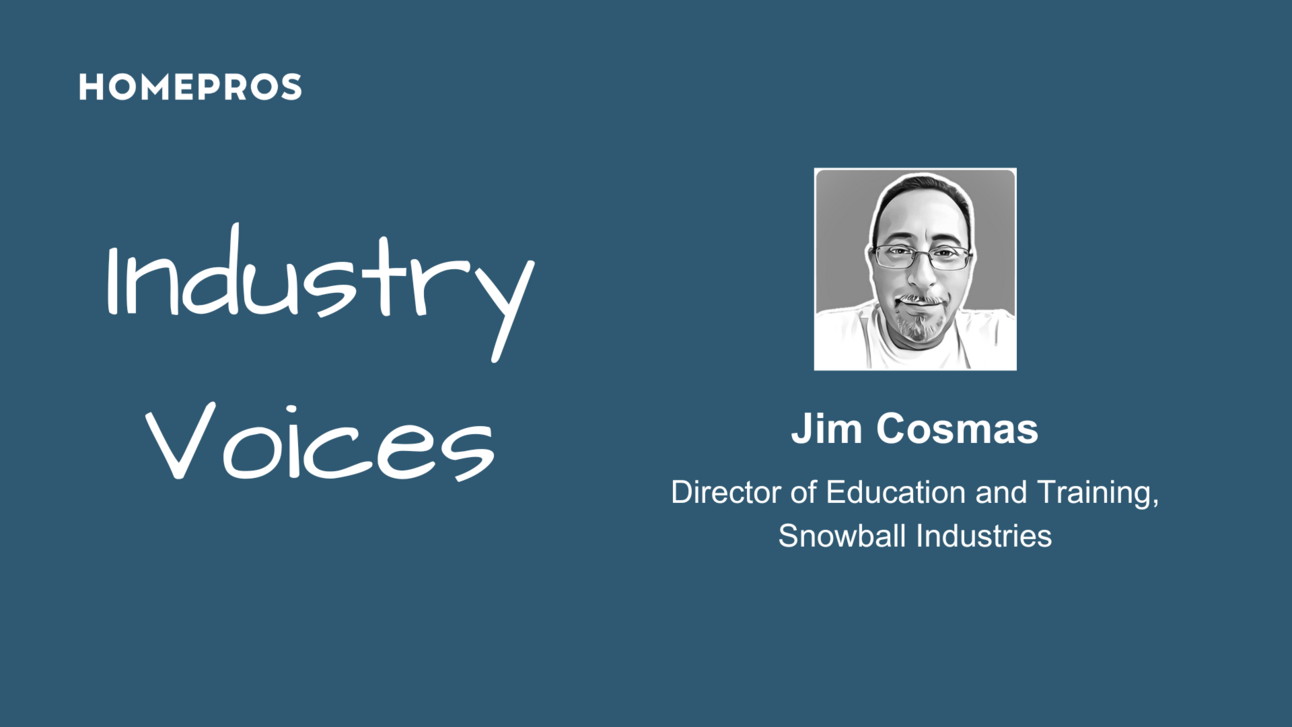Industry Voices: Snowball Industries’ Jim Cosmas
October 6, 2023

📸 Snapshots
“Although the anatomy of a sale has changed over time, the fundamentals of the business haven’t.”
“Everyone likes to talk about the pretty side of business, but they don’t like to talk about the ugly side.”
“Most people think that no matter how sophisticated the technology gets, technicians will always be needed. That’s true, but only to an extent.”
Jim Cosmas
Intro
Jim Cosmas is the mellow, intellectually minded Director of Education and Training at Snowball Industries. We sat down to discuss his path from operator to coach, what to focus on when running a service company, and where the industry is headed.
Below is a summary of our conversation, edited for clarity:
Can you give me some background on yourself?
I come from a family of Greek immigrants. I’m first generation, so I was born here in the US. My family was in the restaurant business, and I grew up in that.
I ended up at the New Jersey Institute of Technology, then got into commercial and industrial refrigeration as a service tech in 1980. And still, to this day, I consider myself a service tech at heart.
You were an operator before you got into coaching. Tell me about that.
I started a couple of commercial refrigeration companies, and the first one went bust. During my time at the second, I partnered with a friend who did HVAC work, and we got into commercial HVAC. The commercial business was okay, but I fell in love with residential when I looked at the difference in cash flows between the two, given that residential is COD.
We ended up selling that business in 2001, and that was when I got really involved in the business side of things. I realized that there were replicable methods to operating these companies.
Over the next seven years, I ran another company that was acquired before being recruited by a big company down in Florida. The branch was in Fort Myers and it was their worst-performing location on the east coast. But fast forward nine months, we were number one. We just implemented everything I learned during my first acquisition.
Now as this was happening, they were going through their own acquisition, and I learned I didn’t play well with big corporations because I didn’t like to stay in my lane.
Now you’re at Snowball. What do you do there?
At a certain point, I started reaching my physical limits when it came to running a company, but I knew a lot about how to run them and thought it’d be exciting to help others grow theirs. So I transitioned to coaching.
I’m at Snowball now, which is a holding company that buys service businesses, where I coach our portfolio companies’ teams. I work with owners, managers, and office and field staff, and create all related content to help them run and grow their companies.
What do you harp on the most when coaching?
-
Knowing your numbers intimately
As an owner or manager, you have to know your numbers. It’s obvious, but most people don’t. A few of the most important metrics to know are the breakeven point, minimum gross margin, and minimum inbound call count and close rate.
-
Developing a brand identity
Some companies never actually develop a brand. A brand is ultimately about having a clearly defined understanding of who you are, and why someone should choose you. Are you a community volunteering organization? Do you associate with a totally different type of warranty? Are you the cheapest, or most premium? Internally, how you run the company, needs to align with those choices, too.
-
Implementation
Most owners have short attention spans and chase shiny objects looking for a magic bullet. But if they just implemented what they already know — the basics — they’d be ahead of 90% of other businesses. And by implementation, I mean a sales process, hiring process, pricing structure, etc. It can seem overwhelming, but to start, I encourage taking three at a time, knocking those out, and then moving to the next three.
Are there any unconventional lessons you’ve learned from coaching?
Yeah — the most obvious and simple thing tends to be what works best. For example, as a mechanically inclined tech, you go deep and assume the solution must be complex when it’s often a simple fix.
The same thing applies to the business side. Although the anatomy of a sale has changed over time, the fundamentals of the business haven’t. There are only so many growth levers to pull, and there’s a reason for that. Because they work.
Social media has made this worse because it’s muddied the water with so much confusing content. But simple works — if implemented.
What do people in the industry not talk about enough?
How ugly business actually is. Everyone likes to talk about the pretty side of business, but they don’t like to talk about the ugly side. For example, there’s something I call dumpster talk, which is the conversation after a company meeting when the biggest troublemaker gathers others around the dumpster and talks about what he or she thinks is really going on.
Not addressing the biggest troublemaker, who may also be the best producer, can cause problems. You should talk to them 1-on-1 to figure out why they behave the way they do and put measures in place to correct their behavior. And if at the end of the day, you have to fire them, it’ll suck, but it’s better than eroding company culture over the long term.
What’s not true today that you believe will be in 3-5 years?
I think AI will have even more impact on the trades than people think. It’s not going to take everyone’s jobs today, but it’ll affect customer service, scheduling, and sales over the next five years.
Most people think that no matter how sophisticated the technology gets, technicians will always be needed. That’s true, but only to an extent. Systems are already able to self-diagnose and allow for remote diagnostics, for example. Eventually, load calculations will be done using AI.
Same with sales. I think contractors need to have a method to sell online. AI will also be relevant here through recommendation algorithms, just like other e-commerce sites.
If you could have dinner with anyone in history, who would it be?
I have two answers, Henry Ford and Elon Musk. Both of those guys had so much tenacity to move things forward and bring products to market. So many technological advances came from what Henry Ford did. And for Elon, he’s a brilliant engineer who doesn’t believe in the word no.
📬 Get our stories in your inbox
Keep reading
Non-Google channels led Q4 average tickets, analysis shows
Customers acquired through Bing and Facebook ads outspent those acquired through Google in late 2024, according to an analysis
AC, Heat Pump shipments drop 16.7% in 2023
February 26, 2024
HVAC distributor sales pop 14% to close out 2024
December marked the best sales growth month of 2024 for HARDI distributors, according to its latest Trends report


